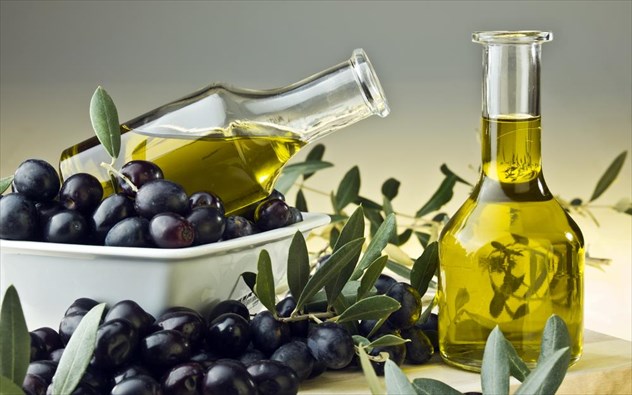Shopping Bag
No products in the cart.

How valid and what should we believe about cooking with olive oil? Yannis Karvelas gives answers and refutes false beliefs.
1. Does olive oil age year after year like wine?
Extra virgin olive oil, like all oils, does not age. On the contrary, the moment we cut the fruit from the tree, the countdown to its life begins. A series of good practices must be implemented in cultivation, harvesting, transport to the mill, in the mill, in storage, and even by the consumer, so that we have real olive juice for several months, without chemical or organoleptic defects.
Obviously, it is difficult to get anything wrong with olive oil that was packaged last year or the year before. Besides, olive oil is also used as a food preservative. But the point is that it must retain its extra virgin quality, i.e. it must have an excellent aroma and taste.
2. Should we only cook with extra virgin olive oil?
The high content of monounsaturated monounsaturated acids and vitamin E in extra virgin olive oil makes it particularly resistant to high temperatures. In fact, research shows that extra virgin olive oil is up to five times more resistant to high temperatures than seed oils (when the oil cannot withstand high temperatures, it breaks down into products that are harmful to health). The natural antioxidants in extra virgin olive oil help absorb vitamins while protecting the body from free radicals and cholesterol.
3. Is cooking with another category of olive oil allowed?
It has been proven that extra virgin olive oil is safe especially for home cooking where it reaches 180° C and in any case does not exceed 220° C, so no trans fats are formed. Alternatively, for cost reasons, the use of olive oil (a mixture of refined olive oil and edible virgin olive oil) or olive oil is allowed in cooking. However, we should not forget that the better the profile of the olive oil we choose, the more nutritious the food we cook.
4. Tips for using extra virgin olive oil in the kitchen
Experts consider a suitable cooking temperature for extra virgin olive oil to be 160° -180° C. That is 3/4 of the way up the ladder in your kitchen, just above the middle.
-Especially when frying, even if you use “extra virgin olive oil”, you should never exceed 15-20 minutes at 180° C. Other oils, e.g. seed oils, cannot withstand this long at this temperature.
– As for seed oils, even lower temperatures than those of olive oil are recommended (below 160° C), as they cannot withstand high temperatures.
– In fact, at temperatures above 180° C, they break down into products that are harmful to health. Studies have shown that under certain conditions (high temperatures, long frying time) it is even possible to produce carcinogenic toxins. This is why it is best not to fry food. However, we can sauté or steam them and not let the olive oil “burn.
– How many times can we use the same “oil”? And then how do you recycle the used one? According to experiments that have been conducted from time to time, 3 fryings are recommended as the limit for changing extra virgin olive oil, “olive oil – a mixture of refined olive oil and edible virgin olive oil”, or olive oil in the pan or fryer. However, ‘extra virgin olive oil’ lasts longer. This is, of course, provided that the temperatures and frying times mentioned are observed.
– If you use seed oil in the fryer, please note the following:
α) Do not add new oil to the already used oil because it has oxidized.
b) Every one or two fryings, at most, the seed oil must be changed.
– If any oil is used too many times, it becomes oxidized, meaning that its components are greatly altered and free radicals are created that are associated with cardiovascular disease and even carcinogenesis.
– Regarding the color of the food after frying, which probably with extra virgin comes out a little darker than seed oil, I will ask a question. What comes first? Health or color? Extra virgin olive oil is not just a fatty substance. It’s a health product, a staple of the Mediterranean diet that, in addition, adding it to food increases the flavor. The extension of its use beyond cooking to pastry making it a valuable ingredient in every dish. The recycling of used oils is done by special companies.
5. Should the olive oil get air? How should it be kept in the home kitchen?
Extra virgin olive oil is eaten fresh. And we need to be trained in this. But how do we keep it fresh? How can we slow down its “decline”? There are four main parameters of olive oil quality during storage:
1) Oxygen
2) The light
3) The temperature
4) The material in contact during storage.
For this reason, it is recommended that our olive oil is stored in stainless steel containers with a tap at the bottom from which the extra virgin olive oil is extracted. Alternatively, we choose to store our extra virgin olive oil in opaque bottles, away from natural light.
If we buy in a large container, once opened, we transfer to smaller glass or stainless steel bottles and store in the coldest part of our home. Also, pay close attention to odors and cleanliness, since olive oil absorbs odors like a sponge. So stay away from cleaners, chemicals, garlic, onions, etc.
Empty containers must be washed very well with hot water and steam as soon as they are emptied because the olive oil residues on the walls are rancid and are a source of contamination for fresh extra virgin olive oil.
6. Is olive oil best kept in the refrigerator or in the freezer?
Ideally the storage temperature should be between 10o° C and 17o° C. So a cool basement is an ideal place for storage. Besides, there is no room in the fridge (and no need) for a family’s year’s supply. If there is no possibility of storing for months in a cool place, then buy a small quantity for immediate consumption.
7. Does the colour of olive oil play a role?
The colour tells us absolutely nothing. Just a few extra olive leaves alone give a virgin olive oil a deceptive deeper green color that most of us think is a sign of higher quality! But the chlorophyll that the leaves have in the presence of light helps to make the olive oil rancid. Even experienced tasters and olive oil tasters are required to taste their samples in dark blue glass tumblers to avoid being influenced at all by the color of each sample.
8. When it is bitter or spicy is it good?
We need to learn that bitter or spicy, along with fruity, are the three positive organoleptic qualities of extra virgin olive oil. Fortunately, in our country there are many varieties with different intensities of bitter and spicy, but also fruity, which can satisfy every consumer’s taste. But remember that the antioxidants due to the polyphenols in extra virgin olive oil have beneficial antioxidant activity both for the product itself and for the health of the consumer.
9. Can it be mixed with seed oil?
It is prohibited at production level. But why would we do it? There is nothing to be gained. On the contrary, we spoil the product. Seed oils contain polyunsaturated fatty acids, while the advantage in extra virgin olive oil is due to the large amount of monounsaturated acids, which have a double bond and are quite stable to oxidation.
10. Which region makes the best oil?
But my field! Or my village! Everyone will tell you with a mouthful, without having tasted another sample, of course.
In Greece we have excellent varieties and regions with amazing results. Apart from the well-known Koroneiki, which is grown everywhere, but mainly in the southern Peloponnese and Crete, I have tasted excellent samples from Makris in Alexandroupolis, Manaki in Corinthia and Argolida, Megaritiki in Attica, Kolovi & Adramitini in Lesvos, Galano and Chondrolia in Halkidiki, Tsounati in Chania, even Thasitiki or Lianolia in Corfu which a few years ago no one would accept to taste.
Also from lesser known varieties, such as Tsampidoelia and Atsicholo in Ilia. But I have also tasted excellent blends from Koroneiki and Manaki, even though in Greece we have mostly single varietal bottlings. Because what has been proven is that good practices in cultivation, harvesting, oiling, storage and standardization are what first of all make the difference and if implemented, the product is very good.
11. What should consumers look out for when buying?
α) Avoid buying olive oil from itinerant and anonymous sellers.
b) Choose branded packaged extra virgin olive oil for safety.
c) Buy from outlets where they can return the product.
All the information and advice was given to us by Yannis Karvelas, olive oil business consultant, director of Paratus Europe.
GIANNA BALAFOUTI
EVOO Improves Brain Protection in Cases of Mild Cognitive Impairment By Paolo DeAndreis Extra virg
Almost a hundred stakeholders have downloaded an algorithm that can provide the ability to predict t
According to commodity pricing data from the International Monetary Fund, global olive oil export pr

